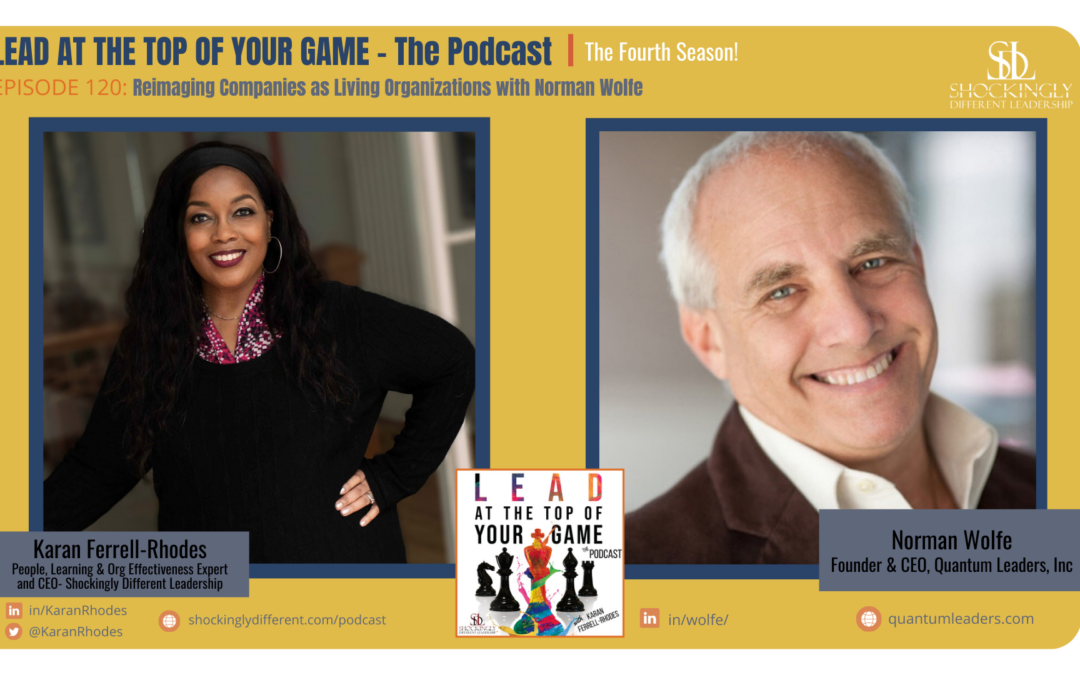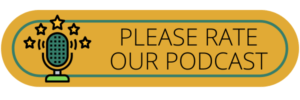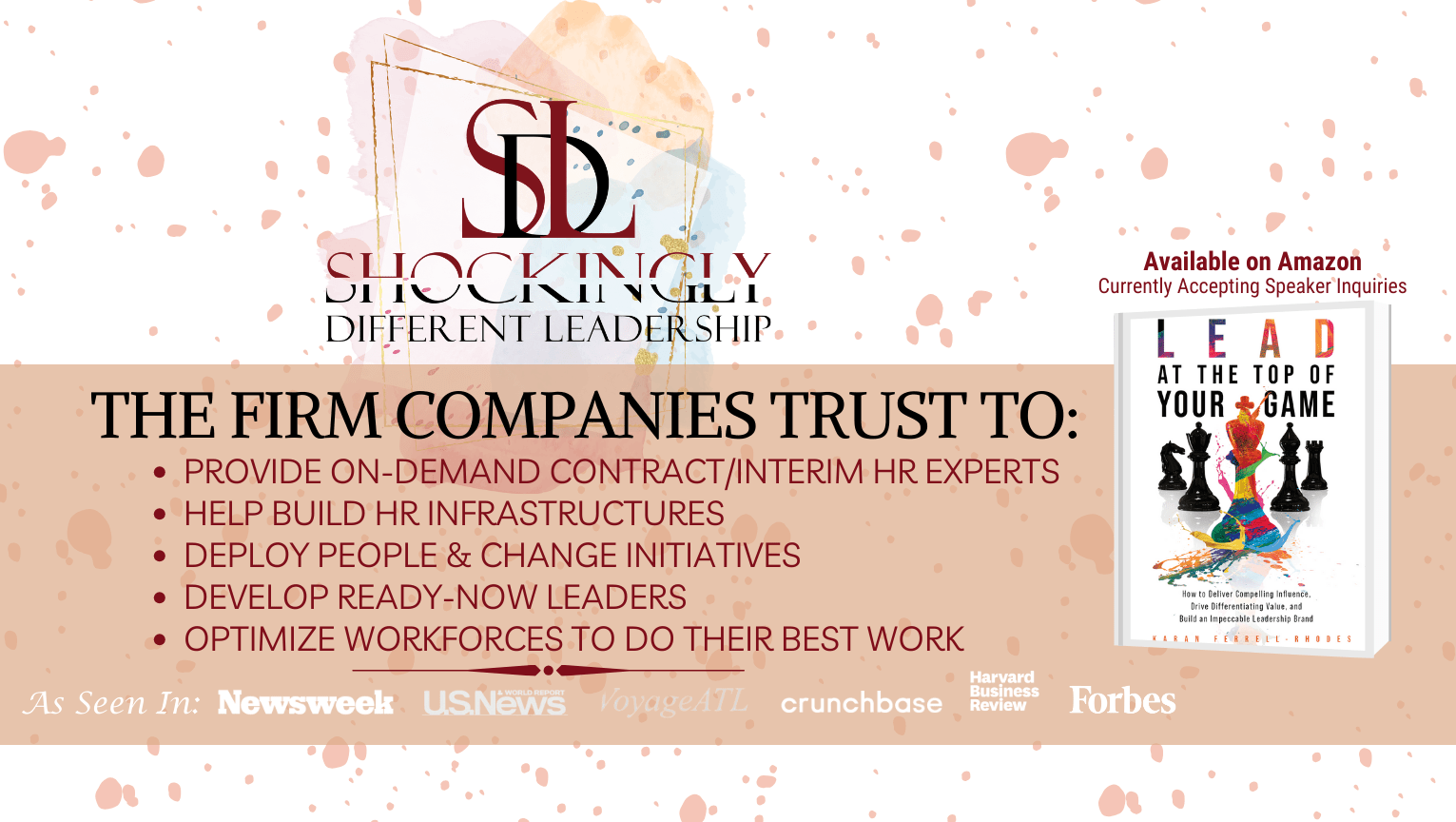IN THIS EPISODE, KARAN FERRELL-RHODES INTERVIEWS NORMAN WOLFE.
Norman shares insights on transforming businesses through his concept of the “living organization.” He explains that 70% of organizations fail to meet strategic goals despite abundant leadership wisdom. Instead of viewing organizations as machines, Norman emphasizes treating them as living systems focused on relationships and belief systems. He discusses the challenges leaders face in this shift and the need to develop communication and behavioral skills.
Norman Wolfe is Wolfe, founder and CEO of Quantum Leaders, Inc., highlights tools like the contribution agreement and explores the impact on trust, culture, and board governance. His approach aims to build self-sustaining, human-centered organizations!
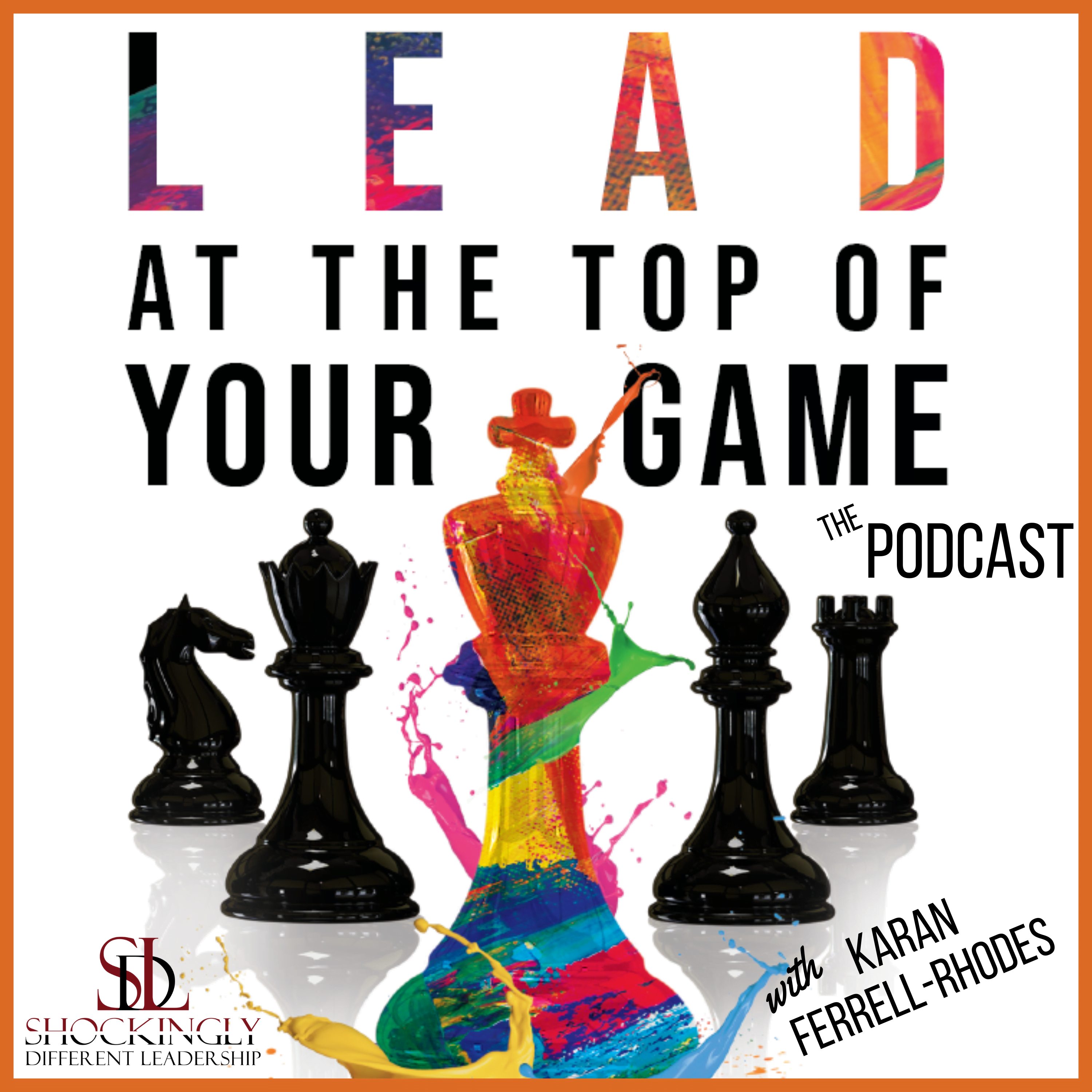
Posted by
SDL Media Team
Rather view our video podcast?

WHAT TO LISTEN FOR:
- What is the concept of the living organization?
- Why do 70% of organizations fail to achieve their strategic objectives?
- What skills do leaders need to develop to implement the living organization model?
- What is the purpose of the contribution agreement tool?
- How can the living organization mindset impact organizational trust and culture?
- Why is it important to develop employees’ maturity and capability?
- How can boards support the executive team and maintain the organization’s vision?
“It is the #1 responsibility of a leader to sustain itself and produce outcomes.”
FEATURED TIMESTAMPS:
[02:40] Norman’s Personal Life and Passions
[04:30] Signature Segment: Norman’s entry into the LATTOYG Playbook: Defining the Living Organization
[13:28] Challenges and Roadblocks in Implementing the Living Organization
[20:53] Impact on Organizational Culture and Trust
[21:40] Application to the Board of Directors
[25:35] Signature Segment: Norman’s LATTOYG Tactic of Choice: Leading with Drive for Results
[26:52] Connect with Norman

ABOUT NORMAN WOLFE
Norman Wolfe is the founder and CEO of Quantum Leaders, Inc., a strategy execution consulting firm focused on transforming businesses to unlock the power of the human spirit. With over 30 years of experience, Norman is a pioneer in leadership and organizational performance, known for guiding companies through significant transitions to achieve extraordinary results.
A former executive at Hewlett-Packard and board member of multiple organizations, Norman is also the author of The Living Organization, a groundbreaking book on creating high-performing companies. He is passionate about shifting business paradigms and helping leaders foster dynamic, living organizations.
LINKS FOR NORMAN:
- Website: quantumleaders.com
- LinkedIn: linkedin.com/in/wolfe
- Facebook: facebook.com/norman.wolfe.5
- X: twitter.com/nswolfe
PEOPLE AND RESOURCES MENTIONED:
Norm’s Book: The Living Organization: Transforming Business to Create Extraordinary Results: a.co/d/66N6u8c
Free Gift – First 3 Chapters of The Living Organization: www.quantumleaders.com/podcast
ADDITIONAL RESOURCES FOR YOU:


Episode Sponsor
SDL is the go-to firm companies trust when needing to:
- supplement their in-house HR teams with contract or interim HR experts
- implement leadership development programs that demonstrate an immediate ROI and impact on the business

Episode 120 | Reimaging Companies as Living Organizations with Norman Wolfe
Norman Wolfe 00:03
Was having a conversation with Bill, the CEO. And I said, “Bill, why did you always use me as a consultant, and why did you put me on the board?” And he said, “It’s easy, you help me execute faster.” So that’s what really kind of triggered me to realize that so much of the work I’ve done over the preceding decades really led me to this notion of what I’m really interested in is, how do you help an organization, a collective of people, go from where they are to where they want to be.
Voiceover 00:03
Welcome to the “Lead at the Top of Your Game” podcast, where we equip you to more effectively lead your seat at any employer, business, or industry in which you choose to play. Each week, we help you sharpen your leadership acumen by cracking open the playbooks of dynamic leaders who are doing big things in their professional endeavors. And now, your host, leadership tactics, and organizational development expert, Karan Ferrell-Rhodes.
Karan Rhodes 00:36
Hello, superstars. This is Karan. And welcome to another episode of the lead at the top of your game podcast, we have a fantastic guest on tap for you today who is going to really talk to us a lot about, you know, strategy, execution, transformation and how we can best show up as our best selves during some of the times, it’s times of chaos, and sometimes it’s times of good progress. So on today’s show, we’re pleased to have Norman Wolfe, who is the founder and CEO of quantum leaders, Incorporated and quantum leaders is a strategy execution consulting firm that’s focused on transforming businesses to unlock the power of the human spirit. He is a former executive at Hewlett Packard and a board member of multiple organizations, but he’s also the author of a fantastic book called The Living organization, which is a groundbreaking book on creating high performing companies. So welcome to the podcast. Norman.
Norman Wolfe 01:39
Thank you, Karan, it’s a delight to be here. I really appreciate the opportunity. It
Karan Rhodes 01:43
is such a pleasure to have you. I know you are extremely busy, so for you to carve out time from me and our listeners is such an honor. And I cannot wait to talk to you about what living organizations really are. But before we get into the nitty gritty. You know, we always love to learn a little bit about our guests and their personal lives and passions. So for just as much as you feel comfortable, would you give us a sneak peek to into your life outside of work?
Norman Wolfe 02:12
I’m not sure I have a life outside of work. I’ve reached the stage in my life. I’ve done so many things. I’m 77, years old now, and over the last, I would say, two decades, I really honed in on what, I guess is my, what I might call my deep, soulful purpose, why I’m here on the earth. What did all these years of experiences provide me, and what can I give back? And the living organization is not just a book, it’s a way of leading organizations that is, as you said, transformative. And I love golf, but that’s not my passion. I love reading, but that’s not my passion. But my passion is that promoting the living organization and helping companies implement it. So in many ways, that is my outside of life, inside of life, I do have a wonderful wife who is, in herself, a business person, but also an artist, and so she fills my life with a lot of beauty and a lot of art. We have two wonderful dogs. There are both of our service dogs. They’re a beautiful breed, both an Australian Labradoodle. So we they fill my life with a lot of joy and love and delight. So reading movies walks into the nature and then the living organization,
Karan Rhodes 03:28
Living organization that is fantastic. Well, one of my similar loves is movies. I’m a movie fanatic, and reminding my husband’s loves is golfing, so I can ship him off with you one day, because he would love it. I just drive the cart, but he’s serious about it. Well, thank you so much for giving us a sneak peek and sharing. We really appreciate it. Well, no, let’s just dive right on in and talk about living organizations. If you can first of all, just define it for my audience on what you mean by that, before we talk about it in depth.
Norman Wolfe 04:02
Well, let’s get back to what you said. I focus on strategy, execution. So around 2000 2001 I was on the board of a public company. He was a former client. While it was still a client, as a consultant, they asked me to join this board, and was having a conversation with Bill, the CEO. And I said, Bill, why did you always use me as a consultant, and why did you put me on the board? And he said, It’s easy, you help me execute faster. So that’s what really kind of triggered me to realize that so much of the work I’ve done over the preceding decades really led me to this notion of what I’m really interested in is, how do you help an organization, a collective of people, go from where they are to where they want to be. And as I began to explore that, and more importantly, as I began to run into these reports and statistics that show 70% of organizations fail to achieve their strategic objectives in couple of things. Two things about that statistic has been fairly consistent for decades, since the 90s or. The first came out. And the second thing is, during that same period, there’s been such a abundance of wisdom, guidance on how to lead more effectively. And I just know CEOs are not dumb. They’ll do anything they can to be successful and and yet, something about this statistic just kind of drove me crazy. So here’s what I came up with. Was the reality that we were living in the paradigm. If you know the nature of a paradigm, it’s a system that sort of locks us into seeing the world a certain way, and so the only solutions we have are with inside that framework. And what I came to believe, and have since pretty much proven it to be true, was perhaps there’s a another paradigm, another framework, another way to look at an organization that would free up the limitations of the way we’re going looking at it, and be able to implement all that wisdom from Tom Peters to Jim Collins to Amy Edmondson to with all the brilliant Daniel Pink and all that brilliant wisdom. And what I concluded was we have this paradigm that looks at an organization like a machine, and the goal of the machine is to take inputs, do something inside this box we call the machine, or the organization, and it produces outputs. And the role of the leader is to design the machine and to oversee it, so it’s as efficient as possible. That’s not bad, in and of itself, but it has some really horrendous negative byproducts. For instance, in that model, employees are nothing more than component parts of the machine.
Karan Rhodes 06:30
Employees are what now,
Norman Wolfe 06:31
Component parts of the machine.
Karan Rhodes 06:33
Component parts? Yes,
Norman Wolfe 06:33
You can see it, even though we don’t talk like that, but
Karan Rhodes 06:37
It’s the truth.
Norman Wolfe 06:37
We want to put the right people in the right seats on the bus, right? That’s like, I want to buy this component and plug it right? Or we have a spec sheet. We call them job descriptions, but it’s a spec sheet for the component that I need to plug into this seat on this box, right? I mean, so
Karan Rhodes 06:52
And when that component leaves or goes bad, what do we do? We go to try to find someone with the same component to plug right back in.
Norman Wolfe 07:02
In some areas, that’s okay, but it doesn’t allow for the power of the creative human spirit.
Karan Rhodes 07:09
That’s true.
Norman Wolfe 07:09
It just keeps them into work. What can you do for me, kind of absolutely, and I’ll pay you this amount of money if you do these things,
Karan Rhodes 07:16
What is a different mindset the leader needs to have, other than from that?
Norman Wolfe 07:21
Well, that’s where the shift starts to come into place. What if we looked at an organization like it was a person, that this collective of people was actually itself, a person, and we asked the question, how do I make this person a high performing individual? Now we look at things like not just what they can do, but how they relate to others. What kind of relationships do they have? How do they interact? We also look at what is their underlying belief system that causes them to behave the way they do? That’s a good one. So in the machine paradigm, we just look at the activity that the individual would do right and we want to optimize activity. In the living organization paradigm, we look at the living person in terms of their activity, their relationship in the context, so that we can optimize the total person to open them up to be more creative. So it’s fundamentally a shift in the way we think of it, and a shift has to happen from thinking of the organization as a machine to that of raising, nurturing and developing a living person. That’s why I call it the living organization.
Karan Rhodes 08:28
So it sounds fantastic if you could reach it. It sounds like it would be Nirvana if we could reach it, but I bet the devil’s in the details, right? So I’m curious, what are examples of things that leaders need to be mindful of or do to start helping to change that perception of the organization just being a kind of a static entity to one being a living organization.
Norman Wolfe 08:58
Well, first is to just acknowledge that the old paradigm doesn’t work right? So you to change your mindset. You have to accept the fact that the way I’m thinking now may be limited and open up to the possibility that there’s something always the first step, the second step is to and this is something I took on as our responsibility working with leaders, that leaders number one responsibility is, was and always will be, ensuring the organization produces the results that ensures its sustainable growth. In other words, results in growth and outcomes are what’s really important for the organization, and therefore the leader, as the custodian of the organization, must do things that do that. So everything we do in the living organization framework is to support the leader’s ability to do that. So the first thing we have to do is establish what are the outcomes we want. You got to know what that is. But what we do is, again, shift the paradigm by saying, okay, in the old paradigm, we use people to get results. Results. Still have to remain number one priority. What if we use the results as the setting up the challenges that serve as the catalyst for the development of the people?
Karan Rhodes 10:10
Oh, starting with the end in mind first.
Norman Wolfe 10:12
Yeah, the reason I want you to develop is because we want to be able to prove your ability to create results. So we want to increase your capacity. If I just view that as a component part, then I’d just be tuning it for capability. But if I looked at as a whole human being, I’d be wanting to develop its capability plus maturity. That’s true. And it’s that maturity element that says I’m developing you as a person, not developing you as a component. And so again, think of it like a parent whose focus is on nurturing and developing their children to be self sufficient adults. Now, if I as a leader, look at my organization as a living person, and I apply that same way of thinking, then I would want to look at my organization and ask the question, How can I develop its ability to be more self sufficient and self sustaining, right, right? And so if you look at how you develop children, it’s not teaching them how to do just math and science and all the stuff they need to do or learn how to balance the textbook, but it’s learning how to interact with others, how to have an open perspective, how to live with rejection, how to how to live life, and then as they grow up, we give them more and more increasing responsibility, because they’ve developed the ability to assume that responsibility. So what if I looked at my organization in that same framework and started as a leader to focus my intention on developing and nurturing the ability for the organization to sustain itself.
Karan Rhodes 11:44
You know, what I love about this Norman is I see so many offshoots of how this thinking can embedder and empower organization on some of the basics. So when you when you look at it, at this perspective that you just shared. I see where there’s, you know, people always talk about trust, you know, or lack of trust in organizations. When you’re looking at a living organization as a quote, unquote person, if you will, that supportive environment will have a positive impact on building trust, essentially extending loyalty and retention to the organization. I see it impacting culture in ways that people kind of own each other’s success, ability to be successful. I can go on and on and on, but I think you get where I’m going. A lot of these critical being in myself and organizational effectiveness and or transformation. I see how that mind shift can impact multiple areas of the very metrics that we’re trying to improve in organizations. And that’s what I love about that thinking. I’d be honest with you, I hadn’t thought about it as a living organization, as a living organization before, but that was kind of my aha moment. Love it.
Norman Wolfe 13:00
Yeah. It’s true. I mean, when you shift the pair, there’s a famous quote by Buckmisnster Fuller. Buckie said, don’t try to solve the problems of the old paradigm. Create a new paradigm and let the old one die away. Right? And back in 2008 nine, when I was writing the book, I came across that, and I realized, as difficult as that’s going to be on my life, because I’m going to be counterintuitive in a lot of ways, it’s what I have to do. That’s why I said it’s my purpose in life, and I believe that’s true. You know, we have to offer leaders a new way of being able to achieve their goal, achieving the goals, the results necessary to sustain growth at the same time, do it in a way that has these positive byproducts instead of the existing negatives, and that’s what the living organization is intended to do.
Karan Rhodes 13:46
But, you know, change in thinking and changing perspectives, and you know, it’s hard to change human behavior, especially of adults that are set in. I’m curious, in your experience, as you’ve been talking to leaders and kind of coaching them on this, how receptive are they, or what major roadblocks do they have in falling back to their own more comfortable way of conducting business? Is this hard? A hard transition for them to put into action, or not so much so?
Norman Wolfe 14:18
No, it’s not easy at all. I liken to years ago, when I was younger, I was a ski instructor, and for whatever reason, I always ended up teaching the beginners skiing or the intermediates. And it there’s a perfect example of what it takes to really shift one’s thinking. Think about it. I’m on a snowy slope, and my whole upbringing says Don’t lean downhill, because you’ll fall and kill yourself. So we learn naturally to lean uphill. And I come along and I say to you, you know, it’s hard checking down this with the snow, if I’m going to show you a very easy way to get down the hill. And. Would be a lot of fun. It’s called skiing. I’m going to put these boards on the bottom of your feet, and all you have to do to control the skis and control your speed is to lean down hill, right? I mean, think about what happens to us as people to learn that process of overcoming my intuitive way of thinking, but that’s what we’re dealing with in changing the paradigm. And so yes, they will get it intellectually, and they think they’re doing it, but they don’t see how there’s a the way they’re speaking, or the way they carry themselves, or the way they frame that question, or how they avoided something, or the fear of the response. I just talked to a CEO yesterday during one of our coaching sessions, and something I’ve been working with him on for probably a year and a half now. And he said to me, you know, Norman, I had a meeting with two of my executives, one yesterday, one this morning, and I finally understood that I was not being very clear and directive in my feedback to them, because I was afraid of the reaction, and that in me has held the company back.
Karan Rhodes 16:05
Wow. What is self reflection?
Norman Wolfe 16:08
Yeah, and that’s what I work with with the leadership, is to get them to see how they’re behaving without any judgment,
Karan Rhodes 16:15
Right, right.
Norman Wolfe 16:15
But with a sense of this is what you’re doing, and this is the results you’re getting. Is that what you want,
Karan Rhodes 16:20
Right.
Norman Wolfe 16:21
And this is where context comes into place, because in this example, for example, he’s very committed to other people, and he wants to give people a lot of room to be successful, to contribute, to do their own thing. And so his in the belief system was, I don’t want to offend anybody, and so what we had to do was frame the giving them feedback is not offending them, it’s helping them. Absolutely. Once he began to see how that actually works, he’s getting much more comfortable giving very positive, constructive, but very poignant feedback, and his people actually responding very positively. So there’s an example of changing context and therefore changing behaviors and therefore changing outcomes, and that’s a key element of the living organization. Model outcomes as a function of behaviors and behaviors as a function of context.
Karan Rhodes 17:08
I’m curious, how deep in organizations do you try to teach this concept? Is it mostly at the C suite level or a couple levels down?
Norman Wolfe 17:17
No, the goal is to take it all the ways through. So like I said, we’re all about changing the paradigm, the way business thinks of itself, and one of the ways we get to the lower levels is changing the whole performance review process. Performance review process is very valuative. I give you your goals. You perform. I tell you how good you did, or big, very parent, childlike, if you will, exactly. Well, it’s easy to say we want to empower employees, but they have to be willing to accept that also. So we have a tool we use. We call it the contribution agreement. It’s a different way of looking at performance, talent development, management. It goes from evaluation to developmental in our thinking, again, shift in the way we think, and the nature of it is, I’m going to give you an opportunity for you to tell me how you’re going to contribute. Here’s what we have to achieve as a team or a department. You have this role, you have this responsibilities. How are you going to take those responsibilities and contribute to us? I’m not going to tell you what you what you should do. Now, just that alone, imagine what that does to employees who are just so used to being told what to do they want to they don’t know how to respond. That’s right, so we take time to work them into it. It’s okay. Let’s start with somebody. Take a guess. Just tell us what you think you want to do, and they’ll come well, maybe this. Maybe. Okay, let me adjust that a little bit, but that’s a good start. And we begin to give them the just like you would with a child, right when you’re developing your child to be more responsible, you got to give them the ability to try something and then see how it works. So we have this methodology we call the contribution agreements, which facilitates it. Now, leaders need some new skills to be able to implement that right? They need a lot of skills in communication and how to get out of the head and be able to go into the heart so they can connect human to human, and how to learn how to when to be directive and when to be coaching, when to be consultative and when to be coaching, right? And there’s a balance. So we have to teach them a whole bunch of skills around that. We have to teach them what context is and how to reframe it and how to work with it. So that’s some of the trainings we do. We have some leadership skills around those, but that’s how you do it. You take it we saw with the CEO, work with the executive team, and then teach them how to work with their people. And over a period of time, it begins to change the whole culture of the organization.
Karan Rhodes 19:41
Love that. You know, I have a colleague who has his own consulting firm too, but his area of focus is on contributorship, and that was my first time hearing it as an concept or entity. But he works more with the worker bees of the organization. Helping, like with cross group collaboration, and helping them to kind of think through how they can best be a better contributor to their colleagues and things. So it’s very interesting to see you know, how you speak about it as a holistically at the leadership level, and then empowering them to push it down. And then he kind of starts, I guess the worker bee level, and hopefully, you know, goes up. So that’s that’s very interesting.
Norman Wolfe 20:25
It’s got to be both. You’re right about that holistic approach. You’re working with any system if you take it from a purely systemic perspective, system. So if you’re going to do something over here, you got to compliment it over here. I mean, if you shift something like this, this is going to try to stay in equilibrium, right? And and so if you want to shift like that, you got to both sides of it to create that shift
Karan Rhodes 20:51
Absolutely. Now I’m curious, Norman, you know, as a also a fellow board member, I’m curious if this concept but also applies, or how it can apply to board of directors as well, because they’re so governance, oversight focused. Is there a way for them to help have oversight or support?
Norman Wolfe 21:12
Yeah, it’s interesting. You asked, I’m a chairman of a board of a nonprofit Rusalam in Israel, and so we’re going through it of reframing it was really a board of advisors, and now we’re moving into a formal board of directors, because the nonprofit is growing, seeking more input, which means more foundation money, which means more fiduciary responsibilities, all those wonderful things. And the question came up with, how does the board maintain that sense of vision and purpose that the founder brought. How do you overlay that with governance responsibilities and not kill that sense of vision that the founder had, and what I’ve come up with, and what I propose to the to the newly forming board, is a three prong responsibility of a board of directors. Certainly, there’s the governance responsibility. But I also believe that they should be the keepers of the vision. They should be the holders of the flame, of why this organization exists and what it’s trying to accomplish. And the third one is what I call mentorship. They should also provide the guidance of the to the executive team, to the leadership team. Now I break it up into three parts, in my experience, on sitting on boards, really good boards, really good directors, intuitively and instinctively do that anyway, because they know that’s the holistic view of what a board is supposed to do. Unfortunately, there’s been a lot of emphasis on the fiduciary the governance responsibility, because that’s how we’re held accountable. And so boards tend to think that’s the number one responsibility. But if they look at the responsibility of I mean, if you go back to The Delaware law, and I did this back in the sorbets Oxley days, I was the chairman of the Governance Committee.
Karan Rhodes 22:57
That’s another podcast right there.
Norman Wolfe 23:01
So I went back to Delaware law. I’m probably misquoting it, but the gist of it was, the responsibility of a board of directors is to ensure the well being of the organization. And if you take that and you look at it from that holistic point of view that we’ve been talking about, then it’s natural to one understand why this organization exists. How can we run it so it’s responsible, efficient, effective? That’s the governance part. And then how can we ensure that the ones we’ve charged with the care of the organization, namely the leadership team, is being effective at doing that well, so you’ve got the keeper of the flame, the governance and the mentorship. That’s that’s the three roles. So when I work with boards, that’s what I highlight, is to have them do be conscious. They have three roles.
Karan Rhodes 23:49
Lovely. Well, listeners. So it no matter if you are a member of a board, member of the C suite, mid level, leader, or just a worker bee the living organization concept applies to you. I think that was the message we could take home here. Well, we’re coming to the end of the podcast segment, but we cannot let Norman sneak out without asking our signature question. And as you know, Norman, this comes out of research that we did on high performing leaders and organizations, and there were seven big buckets of what we call tactics that were key in them being very successful. All are equally as important, but usually, and you use them in different ways and at different times, but usually, there’s a tactic that really pops out and resonates with our guests, and you were so kind to share that leading with a drive for result really resonated with you. And for my newer listeners, a drive for results is all about what it sounds like. It’s all about being very persistent and tenacious, about ensuring your end goals or your objectives are achieved, even if you have to pivot or make. Changes along the way. So curious minds would love to know Norman, why did leading with a drive for results really resonate with you?
Norman Wolfe 25:07
Think you can probably guess, based on what I’ve already said, the number one responsibility of a leader, the number one responsibility of an organization, is to be able to sustain itself and to sustain itself it has to produce outcomes, and so that has to be the number one focus of any organization is, are we producing the outcomes necessary to allow us to sustain ourselves over time? It doesn’t necessarily mean maximizing profit to for the sake of profit. It doesn’t mean growing for the sake of growing. It just means, are we growing at a rate that will allow us to be around 1015, 20, 100 years I was just speaking to a CEO of a company that’s 102 years old. Wow. I mean, that speaks a lot, especially in today’s world. So obviously, if you’re going to sustain yourself, you have to produce results. So yeah, the number one focus has to be on performance calls on results.
Karan Rhodes 26:02
I love that awesome. Well, thank you so much for sharing. Well, you know, we’re gonna have all the information about you, your bio and links and everything in the show notes, obviously, but I love to give air time to our guests to let people know where to find you in case they would like to inquire more about the living organization and your services, if your company. So where can they learn more about you?
Norman Wolfe 26:24
Well, right now you can go to quantumleaders.com it’s quantum leaders with an s dot com you can also look up thelivingorganization.com now that’ll point to my current website, but the new website is coming within the next couple of months, there’s my book on Amazon, the living organization by Norman Wolf. You can get that. And if you’re interested, I’ll I offer all podcasts guests free, free copy a free PDF of the first three chapters. And you can get that at Quantum leaders forward slash podcast. And so all of your participants can have access to that anytime they want.
Karan Rhodes 27:01
Oh, that’s the kind of you. That will be wonderful.
Norman Wolfe 27:04
My email is and Wolf at Quantum leaders.
Karan Rhodes 27:08
Okay, well, listeners will have all this in the show notes as well, but definitely take advantage of taking a look at those first chapters. I bet you’ll be running to Amazon to purchase the book, because you want to know what comes next. But thanks again for the gift of your time, Norman and sharing quite a bit of wisdom with our listeners.
Norman Wolfe 27:28
And if I can just end with a quote I just received one from one of my clients. “Since implementing the principles of the living organization, we have seen a significant increase in collaboration, ownership for our stated goals and objectives, and greater alignment with our values, allowing me as a CEO to grow and evolve.”
Karan Rhodes 27:47
Wow, if that’s not a testimonial, I don’t know what is. Wow, congratulations.
Norman Wolfe 27:53
I just got it and I thought I’d share it with your community and the world.
Karan Rhodes 27:56
That’s wonderful. Congratulations, Norm.
Norman Wolfe 27:59
Oh, you’re so welcome. Thank you for having me.
Karan Rhodes 28:01
Absolutely we loved it, and thank you to listeners for joining this episode and the gift of your time. As I always say, we know there are literally millions of other podcasts that you could be listening to, so we do not take your patronage lightly and truly appreciate you. Please be sure to like and subscribe to the podcast on your favorite podcast platform of choice. We’re everywhere, and also be sure to share the podcast with just one friend, because by doing so, it’ll help us all to better lead at the top of our games. Thanks so much, and see you next week. And that’s our show for today. Thank you for listening to the lead at the top of your game podcast, where we help you lead your seat at any employer, business, or industry in which you choose to play. You can check out the show notes, additional episodes, and bonus resources, and also submit guest recommendations on our website at leadyourgamepodcast.com. You can follow me on Twitter, Facebook, Instagram, and LinkedIn by searching for the name Karan Rhodes with Karan being spelled K a r a n. And if you like the show, the greatest gift you can give would be to subscribe and leave a rating on your podcast platform of choice. This podcast has been a production of Shockingly Different Leadership, a global consultancy which helps organizations execute their people, talent development, and organizational effectiveness initiatives on an on-demand, project, or contract basis. Huge thanks to our production and editing team for a job well done. Goodbye for now.

Want to be a Podcast Guest?
Check out our guest qualifications and submit our brief form to be considered.
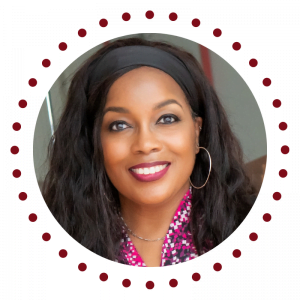
Want Karan to be Your Podcast Guest?
- Blended Workforces & the Gig Economy
- Critical Execution Tactics of High-performing Leaders
- Entrepreneurism & Leading Your Business

Want to be a Podcast Sponsor?
All sponsorships come with a featured spot on show notes pages.
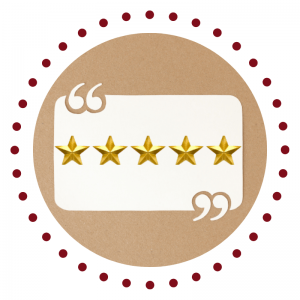
Like the Show? Please Leave a Review
If you like the show, it would mean the world to her if you left a quick review.
Your word is golden, so a HUGE thank you in advance!

#KeepInTouch
via our podcast alerts
Subscribe now to discover why thousands of monthly listeners who are passionate about doing their best work prioritize time each week to listen to the Blended Workforces @Work podcast.
#AboutSDL
#WhereToFindUs
MAILING
4480-H South Cobb Drive
PMB 219
Smyrna, GA 30080
PHYSICAL
2121 NewMarket Parkway
Ste. 108
Marietta, GA 30067
#ContactOptions
Customer Service Email:
service@shockinglydifferent.com
Call or Text:
770-384-1103
#Office Hours
MON-FRI
8:30 AM – 6:30 PM
Weekends By Appointment

